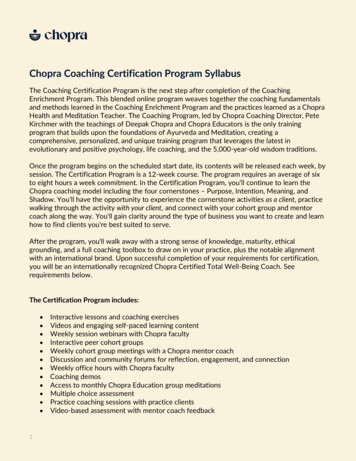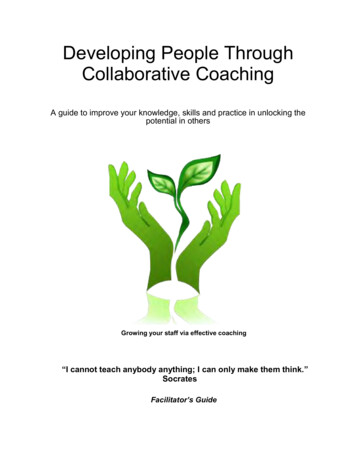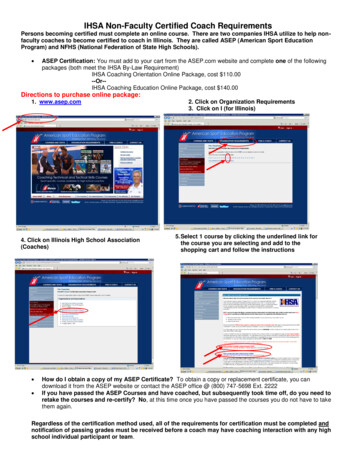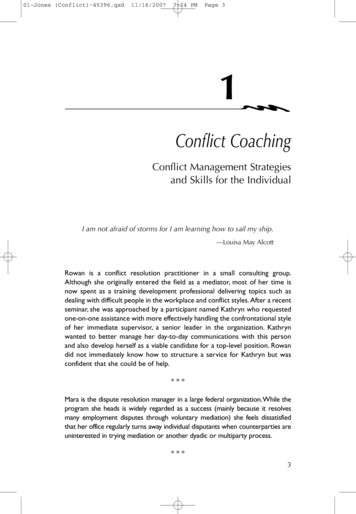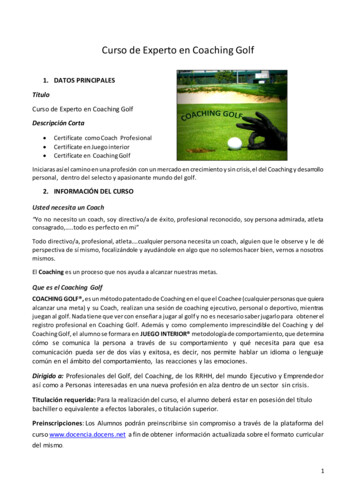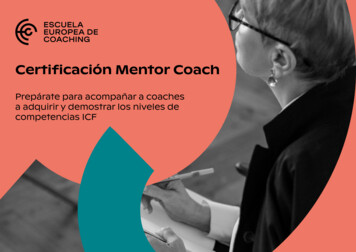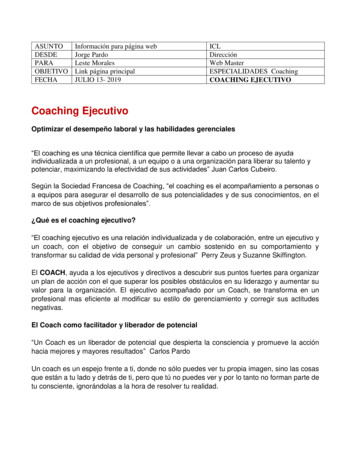
Transcription
European Mentoring and Coaching ConferenceDublin, 2010Leadership Development Group Coaching:The INSEAD Global Leadership Centre ApproachAgata Halczewska-FiguetExecutive DirectorIGLCElizabeth Florent-TreacyAssociate Director, abeth.florent@insead.eduWho are we?INSEAD Global Leadership Centre(INSEAD is a top-tier global business school with MBA, PhD andexecutive programs; in France, Singapore and Abu Dhabi) Research on LD using a psychodynamic framework Design and psychometric testing of LD 360 s Internal and external exec ed LD modules and prgms Individual and group coaching; CSPs and OEPs 2nd largest centre for group coaching (15,000 execs 20052010) Experienced with mixed culture / nationality groupsManfred F.R. Kets de VriesRaoul de Vitry d’Avaucourt Clinical Professor ofLeadership Development,and Director, INSEAD Global Leadership CentreA psychodynamic approach to leadership group coaching:theoretical frameworksAt INSEAD Global Leadership Centre (IGLC), we develop, research and use in thebusiness school classroom, a specific type of intervention that can be carried outstrategically with individuals, teams, or an entire organization. Our aim is to direct aperson or group of people toward a specific, mutually determined goal, acceleratingprogress by providing focus and awareness. It is about helping our participants—mid-1
and senior-level executives—to reach full potential, to re-energize for a senior career,or to help them actualize their strengths and minimize their weaknesses. We seecareer and leadership development as a holistic process with a dual focus, both micro(the individual) and macro (the organization).In our writing and the modules and courses we teach through IGLC (under thedirection of Prof. Manfred Kets de Vries), we take a psychodynamic approach toleadership. Particularly in our small group executive development coaching sessions,we look at different strata of awareness, structural parallels, patterns and recurringthemes that come out as we take the time to listen to participants’ stories. We use themetaphor of “peeling the leadership onion” to explain the importance of lookingbelow the surface. We explore ambiguities, invite interpretations of behavior, look forthe rational reasons behind seemingly irrational actions and decisions.How do we introduce the psychodynamic concept?The Leadership Onionactionspreferedleadershipstylevalues,beliefs andattitudesPersonality andcharacter traits“inner theater”We often say that working in organizations can be like trying to navigate through afield of icebergs: much danger may lie hidden below the surface. This concept alsohelps people visualize the overt and covert interpersonal dynamics that can affectteam performance. We remind people that, even in organizations: All human behavior, no matter how irrational it may seem, has a rationalexplanation. Our unconscious plays a powerful role in determining our actions. Motivational needs systems create the triangle of mental life: cognition,emotion, and behavior.2
We all have blind spots and defensive reactions that make it difficult for us toexplore our own inner theatre. Our emotions shape and influence our identity and behavior. The past is the lens through which we can understand the present and shapethe future.In practice, IGLC uses an innovative executive group coaching approach with thispsychodynamic orientation, a process by which we help leaders to lead and directindividual and organizational transformation and change, and to create a coachingculture within organizations. IGLC is the largest provider of leadership groupcoaching in the world by numbers of participants, and our experience shows thatalthough the more classical one-to-one approach to coaching is valuable in manycontexts, group coaching can be even more effective. At the same time, this approachis firmly grounded in the psychodynamic tradition, and our coaches are trained to takea Socratic approach, asking a series of questions about a central issue, and trying tofind satisfactory answers through dialogue. The use of questions and conversationimplies that a leadership coach begins from a position of humility and curiosity, ratherthan authority and knowledge. Finally, this reflective approach is effective in that itresults in action planning for change that is pragmatic and realizable.What are the key objectives of the group session?Establish a safe transitional space where participants can explore andexperiment in a playful way. No one is obliged to participate.The group does the work! The coach maintains the space.Incorporate both cognitive input and emotional reactions: create tippingpoints, ah-ha moments of insight, and “kick in the pants” feedback.Reflect on how past experiences can affect present relationships.Assess alignment between anindividual’s career choices and theirown preferred leadership style.Identify two or three action points,with learning partners, and timeline.Help all participants hone theircoaching skills.3
EMCC Session, an overviewThe 90 minute EMCC (Dublin, 2010) workshop will take a mixed method approach.We will begin with a brief (10 minute) overview of the psychodynamic frameworkthat we apply in our work, followed by a 20 minute video demonstration of the groupcoaching method by Prof. Manfred Kets de Vries. Next, we will provide participantswith brief written materials (including the IGLC 360 feedback instrument the GlobalExecutive Leadership Inventory, available for public use) from a participant (real butdisguised) in a group coaching session. We will invite workshop participants to worktogether in small groups as if they were preparing for a group session including this“coachee,” taking into consideration what they find to be his challenges, concerns,and life and career options. Key questions participants will be asked to explore:1. As they look at the feedback results, what is the group’s first impressions,insights or emotional reactions?2. If they were in a group coaching session with this executive, what questionswould they ask?3. What does the group see as red flags that indicate areas in which (in the realworld) they might need to have a “courageous conversation” with thecoachee?4. How does the life narrative of the “coachee” affect the group’s thinking?5. Based on what they know, what feedback would the group give the“coachee”?In the last 20 minutes of the session, we will bring participants back together to sharetheir impressions of this experiential taste of the group coaching method. We providethe epilogue to the coachee’s story, and an overview of the developmental journeythat he embarked on over the course of nine months. We wrap up with the keylearning points below:4
Key learning all behavior has a rational explanation e.g. missing meetings our unconscious plays a role in determining our actions e.g. dreams behavior in the present may be influenced by past relationships e.g. father-son our emotions have a powerful effect on our behavior e.g. feeing trapped and hopeless 1. Importance of individual and systemic approach in coaching(e.g., Middle East culture; family business)2. Alignment between personal preferences and organizational roleAuthentic leadershipAbout the presentersELIZABETH FLORENT-TREACY is the Associate Director, Research of theINSEAD Global Leadership Centre, Fontainebleau, France, and Singapore, Liz is anAmerican who has lived and worked in France for over twenty years. She leads ateam of researchers who explore and publish on the following themes: groupleadership development coaching; global leadership; global organizations; corporateculture in European and global organizations; American, French and Russian businesspractices; family business issues (governance, succession, strategy); entrepreneurialleadership; cross-cultural management; women and global leadership; cultural aspectsof mergers and acquisitions; transformational leadership; expatriate executives andfamilies; and the psychodynamic approach to career and leadership developmentexecutive education programs. In addition, the IGLC research team develops 360 leadership survey instruments for use in executive coaching for individuals, teams,and organizations; and works with IGLC faculty to provide innovative content andmethods for leadership development modules and programs.5
Liz works as an executive coach in the areas of career development and familybusiness. She also specializes in coaching for academic writing projects. Liz haswritten 25 case studies on leadership or family business, six of which won top casewriting awards (ECCH and EFMD). She has co-authored or authored 25 articles,working papers and book chapters, and co-authored five books on leadershipdevelopment and family business topics. She holds degrees in Sociology (BA),Organizational Development (MA), and a Diploma in Clinical OrganizationalPsychology (INSEAD, magna cum laude). Her thesis described factors that supportedor hindered individual change over time in a multi-module “identity laboratory”leadership development program.AGATA HALCHEWSKA-FIGUET, in her role of Executive Director of INSEADGlobal Leadership Centre, focuses on strategic management of the center’s globalstakeholders. She is involved in the design and delivery of top executive programsand she coaches most senior clients. Agata combines her extensive experience indiverse multicultural business environments with solid expertise in executivecoaching. Prior to joining INSEAD, Agata worked with international corporations invarious industries. In her corporate life she focused on strategic people management,organizational development, change management, talent and leadership development.With a background in economics, Agata holds a post graduate qualification in humanresources management (IGS, Paris). Also, as a graduate from INSEAD Coaching andConsulting for Change program she holds the INSEAD Diploma of ClinicalOrganizational Psychology. Agata is a member of ISPSO (The International Societyfor the Psychoanalytic Study of Organizations). Agata works internationally withglobal clients mainly as an organizational leadership consultant and executive coach.Of Polish origin, she has been working and living in Poland, UK, Belgium and Francefor the last 20 years.6
Leadership Development, and Director, INSEAD Global Leadership Centre INSEAD Global Leadership Centre (INSEAD is a top-tier global business school with MBA, PhD and executive programs; in France, Singapore and Abu Dhabi) Research on LD using a psychodynamic framework Design and psychometric testing of LD 360 s



